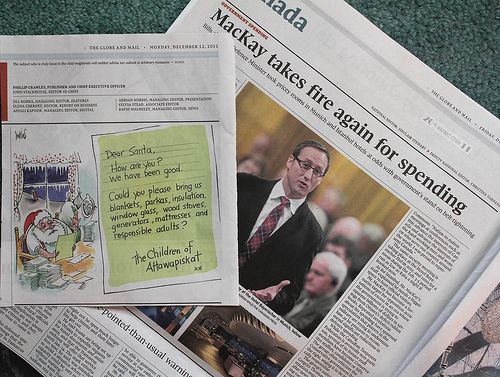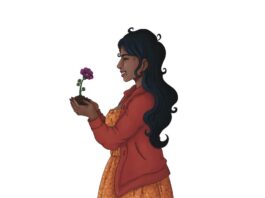By Sean Evans (The Cascade) – Email
Print Edition: January 25, 2012
Over the past few months, the press has been littered with articles about the humanitarian crisis in the Attawapiskat Native Reserve in northern Ontario. Some have blamed the federal government for a lack of funding, while others have taken aim at the leaders of the reserve for a lack of fiscal accountability and for floundering away up to $90 million—the numbers are debated—since the Conservatives took power in 2006. Others still have called for the finger pointing to stop and for the problem to be fixed.
The problem facing Attawapiskat cannot be viewed in isolation. What we’re seeing in the small community of approximately 1500 residents is indicative of widespread dysfunction in the way in which native reserves and the federal government interact. Each year, Attawapiskat receives $17.6 million in federal funding, $4.4 million in provincial funding and approximately $12 million in local revenues. According to these figures, the small community operates on a budget of approximately $34 million per year.
That works out to approximately $22,666 per person, man, woman, and child. A family of five represents $113,333 of available funds per year in the community. When viewed in light of the current state of the small community, something is clearly wrong.
Obviously, the individual resident of Attawapiskat does not recieve a cheque for $22,666 each year. Funding from the federal and provincial governments is handled by the Attawapiskat council. With these funds, the council is expected to provide the community with all of the services that federal and provincial governments provide to other Canadians – education, transportation, emergency housing, and so forth. The problem is, however, that these services are simply not being provided in Attawapiskat. It is unclear how this large sum of money has been spent over the last few decades. In fact, an audit last year reported that the band is $11.3 million in debt.
At this point, it would be easy to rant about the utter foolishness of the Attawapiskat band in not having any form of a functioning budget. It would easy to rant about the failure of the federal and provincial governments to provide adequate guidance and oversight while sending millions and millions of dollars into a black hole. It would be easy to rant about the ludicrous salaries ‘earned’ by the Chief and council members. It would be easy to rant about the fact that many reserves are simply not sustainable and the need for the A-word – assimilation.
I choose my wording carefully: I am a white male, and I see things from the perspective of who I am. We must not hide from the fact race is an issue here. It is difficult not to become frustrated when I see the vast amount of money that is pumped into the reserve system and the social and economic devastation that has resulted. The problem, however, is that if the federal government demands the right to insure fiscal accountability and proper management of funds, many natives will cry foul – that their national sovereignty is at stake.
As a white male, however, I must take a step back and realize that, although I have never given blankets infected with smallpox to unsuspecting natives, I am guilty of that action. I have reaped the benefits of that crime through the land that I live on and eat from. Although I have never stolen young native children from their families and forced them to adopt European language and culture through attending residential schools, subjecting them to physical, emotional, and sexual abuse, I am guilty of that crime. As a white male, a part of the cultural majority, my way of life has thrived following the destruction of native cultures. As Canadians, we must own up to the fact that our past is a part of our present. The devastating social problems that plague native populations in Canada are, in some measure, the result of our actions.
What I have come to realize, and what we must continue to remember, is that the issues facing Attawapiskat are human issues. I have seen first-hand the social and financial problems that face those on reserves through a cousin who lives on a reserve with her young family. I have glimpsed the struggles faced by the First Nations people, and it causes me to remember that these are human beings, just like me. There are people in that small, isolated reserve who are hurting. Children are suffering, mothers are not sure where the next meal will come from, and fathers are struggling to provide for their families. For now, we need to let the brutal mismanagement of funds go for the moment, and focus on simply helping these people who are in a desperate position.
What would it look like for us to help them? For the small reserve of Attawapiskat, it would mean stepping in to provide emergency shelter, clothing, and food. Chief Theresa Spence has demanded that the federal government send $1.5 million so that payroll can be made. At the same time, Spence has refused to allow a third-party manager, appointed by the federal government, to step in to get the situation under control. Would it really be helping the people of Attawapiskat by simply cutting another cheque and washing our hands of the situation? No. By no means. In a letter to the federal government, Grand Chief Stan Louttit, regional chief of the Attawapiskat area, wrote that “[o]ur idea all along has been… [to] reinstate the autonomy of the Attawapiskat First Nation.” This poses a problem. Quite clearly Attawapiskat has not been fiscally autonomous for a long time, and in their autonomous self-governance, they have failed to properly manage and plan.
As Canadians, we must take a step back and look at the situation of the reserve system. As I have noted, we owe a debt to the First Nations of Canada, so I do not suggest a complete elimination of the fiscal benefits they receive, nor do I suggest a simple assimilation. That said, we must reform the Indian Act and change the way that life on the reserve functions – if reserves are to continue to exist at all. We must, and First Nations must, reconsider the future of our Nations. First Nations communities, like those in the position of Attawapiskat, must consider the lives of their children. Is there a future for them on the reserve? At the moment, it looks doubtful. We must question whether or not it is ultimately helpful or harmful to continue sustaining communities that are simply unsustainable. It is not only Attawapiskat that is at stake — if Attawapiskat serves as a sort of litmus test of the functioning of the reserve system, changes are clearly needed. The system is deeply flawed. Should we not encourage fiscal sustainability and autonomy, rather than simply sending funds, year after year? Are we, as non-native Canadians, to be forever sending money into an abysmal system of isolation and continuous patterns of poverty and social ills? Perhaps we ought to reconsider what we owe to the First Nations of Canada. Do we owe it to them to continue sending money to corrupt and ill-equipped chiefs and councils? Or do we owe it to them to support their moving forward toward integrating—integration, not assimilation—into Canadian society?




